O-glycosylation regulates ubiquitination and degradation of the anti-inflammatory protein A20 to accelerate atherosclerosis in diabetic ApoE-null mice
- PMID: 21151899
- PMCID: PMC2997780
- DOI: 10.1371/journal.pone.0014240
O-glycosylation regulates ubiquitination and degradation of the anti-inflammatory protein A20 to accelerate atherosclerosis in diabetic ApoE-null mice
Abstract
Background: Accelerated atherosclerosis is the leading cause of morbidity and mortality in diabetic patients. Hyperglycemia is a recognized independent risk factor for heightened atherogenesis in diabetes mellitus (DM). However, our understanding of the mechanisms underlying glucose damage to the vasculature remains incomplete.
Methodology/principal findings: High glucose and hyperglycemia reduced upregulation of the NF-κB inhibitory and atheroprotective protein A20 in human coronary endothelial (EC) and smooth muscle cell (SMC) cultures challenged with Tumor Necrosis Factor alpha (TNF), aortae of diabetic mice following Lipopolysaccharide (LPS) injection used as an inflammatory insult and in failed vein-grafts of diabetic patients. Decreased vascular expression of A20 did not relate to defective transcription, as A20 mRNA levels were similar or even higher in EC/SMC cultured in high glucose, in vessels of diabetic C57BL/6 and FBV/N mice, and in failed vein grafts of diabetic patients, when compared to controls. Rather, decreased A20 expression correlated with post-translational O-Glucosamine-N-Acetylation (O-GlcNAcylation) and ubiquitination of A20, targeting it for proteasomal degradation. Restoring A20 levels by inhibiting O-GlcNAcylation, blocking proteasome activity, or overexpressing A20, blocked upregulation of the receptor for advanced glycation end-products (RAGE) and phosphorylation of PKCβII, two prime atherogenic signals triggered by high glucose in EC/SMC. A20 gene transfer to the aortic arch of diabetic ApoE null mice that develop accelerated atherosclerosis, attenuated vascular expression of RAGE and phospho-PKCβII, significantly reducing atherosclerosis.
Conclusions: High glucose/hyperglycemia regulate vascular A20 expression via O-GlcNAcylation-dependent ubiquitination and proteasomal degradation. This could be key to the pathogenesis of accelerated atherosclerosis in diabetes.
Conflict of interest statement
Figures
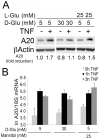
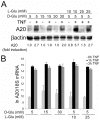
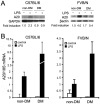
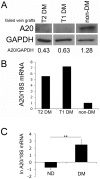


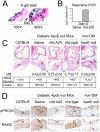
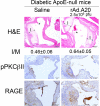
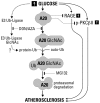
Similar articles
-
The protective effect of A20 on atherosclerosis in apolipoprotein E-deficient mice is associated with reduced expression of NF-kappaB target genes.Proc Natl Acad Sci U S A. 2007 Nov 20;104(47):18601-6. doi: 10.1073/pnas.0709011104. Epub 2007 Nov 15. Proc Natl Acad Sci U S A. 2007. PMID: 18006655 Free PMC article.
-
O-Linked β-N-Acetylglucosamine Modification of A20 Enhances the Inhibition of NF-κB (Nuclear Factor-κB) Activation and Elicits Vascular Protection After Acute Endoluminal Arterial Injury.Arterioscler Thromb Vasc Biol. 2018 Jun;38(6):1309-1320. doi: 10.1161/ATVBAHA.117.310468. Epub 2018 Apr 5. Arterioscler Thromb Vasc Biol. 2018. PMID: 29622561
-
A20 regulates atherogenic interferon (IFN)-γ signaling in vascular cells by modulating basal IFNβ levels.J Biol Chem. 2014 Nov 7;289(45):30912-24. doi: 10.1074/jbc.M114.591966. Epub 2014 Sep 12. J Biol Chem. 2014. PMID: 25217635 Free PMC article.
-
A20 inhibits NF-kappaB activation by dual ubiquitin-editing functions.Trends Biochem Sci. 2005 Jan;30(1):1-4. doi: 10.1016/j.tibs.2004.11.001. Trends Biochem Sci. 2005. PMID: 15653317 Review.
-
Expression, biological activities and mechanisms of action of A20 (TNFAIP3).Biochem Pharmacol. 2010 Dec 15;80(12):2009-20. doi: 10.1016/j.bcp.2010.06.044. Epub 2010 Jul 3. Biochem Pharmacol. 2010. PMID: 20599425 Review.
Cited by
-
A20 Haploinsufficiency in a Chinese Patient With Intestinal Behcet's Disease-Like Symptoms: A Case Report.Front Immunol. 2020 Jul 3;11:1414. doi: 10.3389/fimmu.2020.01414. eCollection 2020. Front Immunol. 2020. PMID: 32719680 Free PMC article.
-
A20: a master regulator of arthritis.Arthritis Res Ther. 2020 Sep 21;22(1):220. doi: 10.1186/s13075-020-02281-1. Arthritis Res Ther. 2020. PMID: 32958016 Free PMC article. Review.
-
The ubiquitin-proteasome system and cardiovascular disease.Prog Mol Biol Transl Sci. 2012;109:295-346. doi: 10.1016/B978-0-12-397863-9.00009-2. Prog Mol Biol Transl Sci. 2012. PMID: 22727426 Free PMC article. Review.
-
A20-mediated modulation of inflammatory and immune responses in aortic allografts and development of transplant arteriosclerosis.Transplantation. 2012 Feb 27;93(4):373-82. doi: 10.1097/TP.0b013e3182419829. Transplantation. 2012. PMID: 22245872 Free PMC article.
-
Dysfunction of the ubiquitin-proteasome system in atherosclerotic cardiovascular disease.Am J Cardiovasc Dis. 2015 Mar 10;5(1):83-100. eCollection 2015. Am J Cardiovasc Dis. 2015. PMID: 26064796 Free PMC article. Review.
References
-
- Faxon DP, Fuster V, Libby P, Beckman JA, Hiatt WR, et al. Atherosclerotic Vascular Disease Conference: Writing Group III: pathophysiology. Circulation. 2004;109:2617–2625. - PubMed
-
- Kaiser N, Sasson S, Feener EP, Boukobza-Vardi N, Higashi S, et al. Differential regulation of glucose transport and transporters by glucose in vascular endothelial and smooth muscle cells. Diabetes. 1993;42:80–89. - PubMed
-
- Alpert E, Gruzman A, Riahi Y, Blejter R, Aharoni P, et al. Delayed autoregulation of glucose transport in vascular endothelial cells. Diabetologia. 2005;48:752–755. - PubMed
-
- Nishikawa T, Edelstein D, Du XL, Yamagishi D, Matsumura T, et al. Normalizing mitochondrial superoxide production blocks three pathways of hyperglycaemic damage. Nature. 2000;404:787–790. - PubMed
Publication types
MeSH terms
Substances
Grants and funding
LinkOut - more resources
Full Text Sources
Medical
Molecular Biology Databases
Miscellaneous

